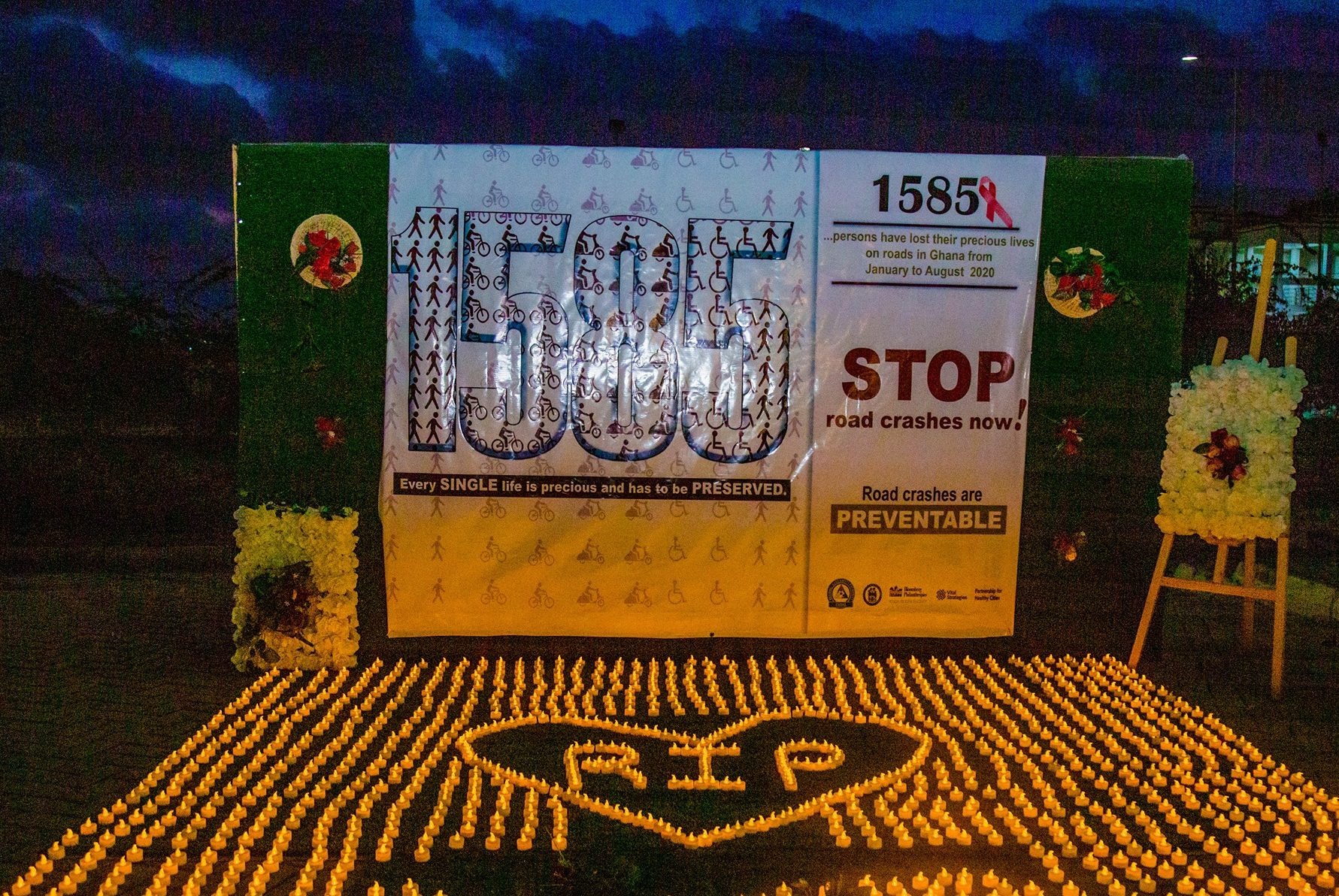World Day of Remembrance for Road Traffic Victims is observed annually in November on the third Sunday
On World Day of Remembrance for Road Traffic Victims, we remember the more than 1.35 million lives lost each year on the world’s roads. The annual observance offers an opportunity for communities around the world to join together, honor the lives lost to road crashes and allow victims to share their stories. It also marks a pivotal moment for city leadership to advocate and commit to public health approaches that can prevent traffic crashes, deaths and injuries.
Through the Bloomberg Philanthropies Initiative for Global Road Safety (BIGRS), Vital Strategies and the Partnership for Healthy Cities has supported the efforts of more than 20 cities to enact smart evidence-based strategies that save lives including: improving data surveillance systems, changing road user behavior through communication strategies, supporting the strengthening of legislation, and addressing the key risky behaviors of speeding, drink driving, lack of helmet use and lack of seat-belt use.
On the 25th anniversary of World Day of Remembrance for Road Safety Victims, it’s time to address road safety as a public health crisis.
Here’s how eight cities are recognizing the devastating impact of road crashes in their communities, honoring victims and their families, and pledging to protect people on the roads:
Accra, Ghana: Candles Honoring Lives Lost
In Accra, the National Road Safety Authority (NRSA) and the Accra Metropolitan Assembly (AMA) decorated a wall of remembrance on the grounds of the AMA. The wall displayed the number of people who have died from road crashes from January through August of 2020 in Ghana—a tragic 1,585 lives lost. Placed in front of the wall of remembrance were candles representing these 1,585 lives lost. Two victims of road crashes shared their stories, delivering touching remarks on their experiences on the roads of Ghana. Sylcia Eshun, a high school senior, and Thomas Acquahs stories highlighted the urgent need for effective road safety policies and initiatives to protect all Ghanaians. Mayor of Accra Mohammed Adjei Sowah, Chief Director of the Ministry of Transport Mabel Sagoe, Director General of the NRSA May Obiri Yeboah, and representatives from the police Motor Traffic and Transport Division were among the officials who joined the commemorative program.
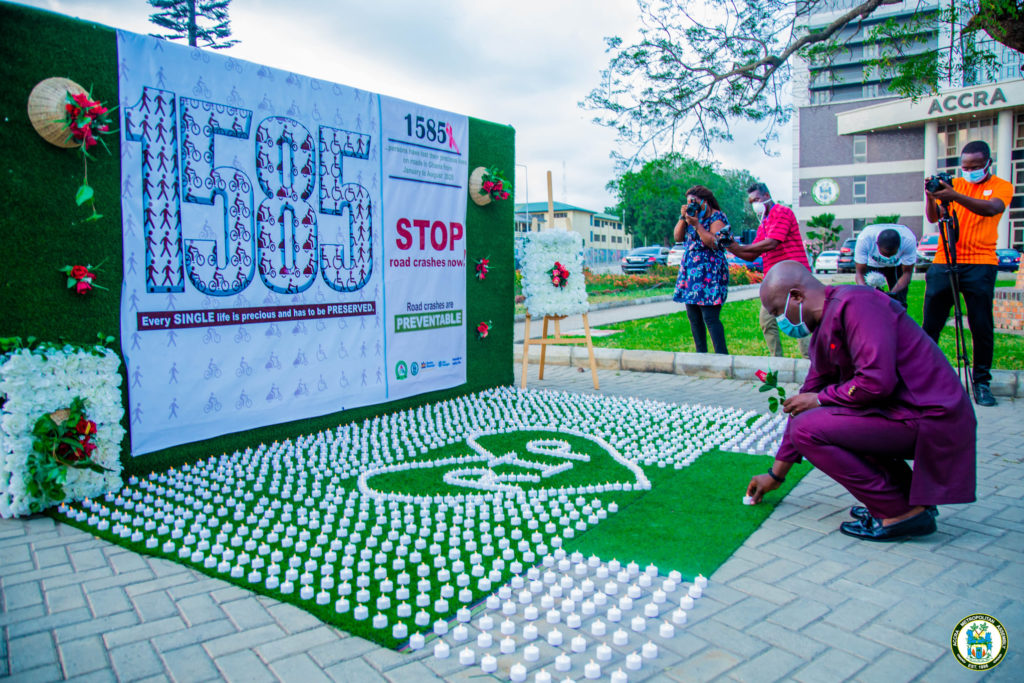
Kumasi, Ghana:, Messages of Solidarity
Mayor of Kumasi Osei Assibey Antwi, along with various leaders of road safety organizations, visited the Ashanti region’s biggest hospital, Komfo Anokye Teaching Hospital’s Accident and Emergency Unit, where approximately 40% of its patients are victims of traffic crashes, to spend time with and support road crash victims. The mayor was joined by the Police Commander for Manhyia Division ACP Kwaku Buah, Regional Motor Traffic and Transport Division Commander Supt. Emmanuel Adu Boahen, Metro Coordinating Director for Kumasi Metropolitan Assembly Kwadwo Akuamoah Boateng, and representatives from the National Road Safety Authority.
During the visit, officials shared messages of solidarity and donated food, toiletries and personal protective equipment to the road crash victims at the hospital.
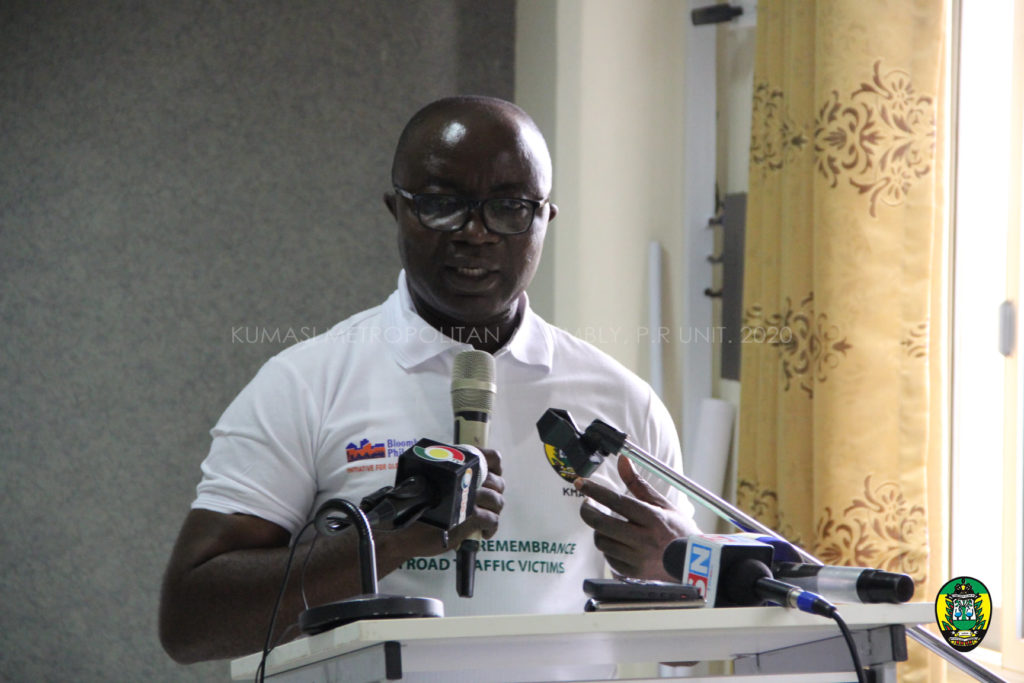
Quito, Ecuador: A Moment of Silence
In a joint event with the Ministry of Transport and Public Works and the National Agency of Transit, the City of Quito partnered with BIGRS, the Hearts in the Sky Foundation and Fundación Karumato to commemorate crash victims. During the event, community members rang bells, placed memorial flowers, monuments were illuminated, and a torch was lit. Attendees also held a commemorative bicycle ride and offered a moment of silence as Secretary of Mobility Guillermo Abad and Director of the Metropolitan Agency of Transit Juan Manuel Aguirre joined road safety stakeholders to discuss the steps they will take to reduce road traffic deaths. Family members of victims joined the event and shared stories of their loved ones.
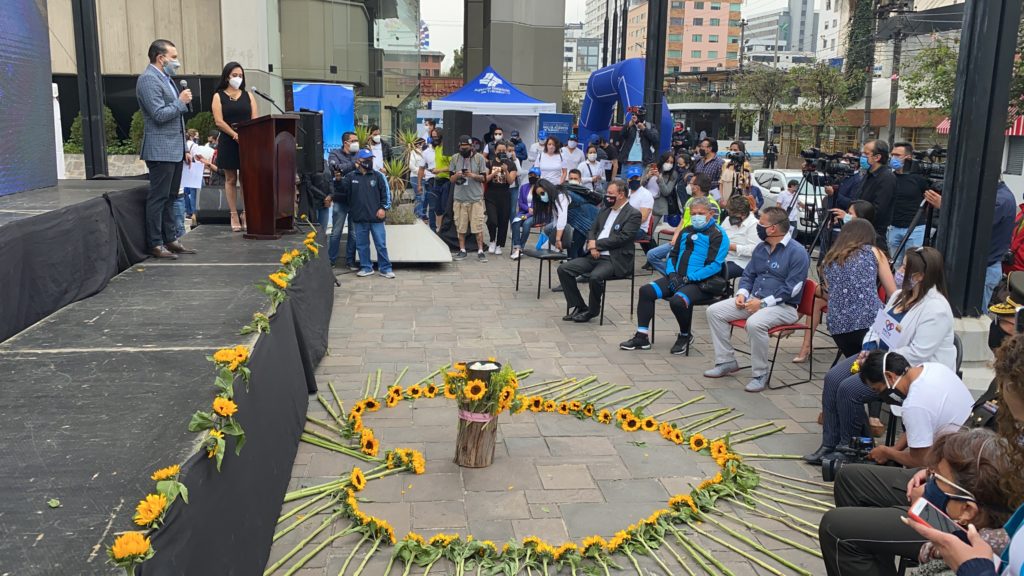
Officials in Quito honored lives lost on the roads during a flower laying ceremony.
Guayaquil, Ecuador: A Monument to Lives Lost
In Guayaquil the Municipal Authority of Transit held a commemorative event to remember the 113 lives lost on the city’s roads in 2019. An artistic installation depicting the names of victims who lost their lives on the roads was displayed downtown and fueled community discussion of the impact traffic crashes have on families and communities.
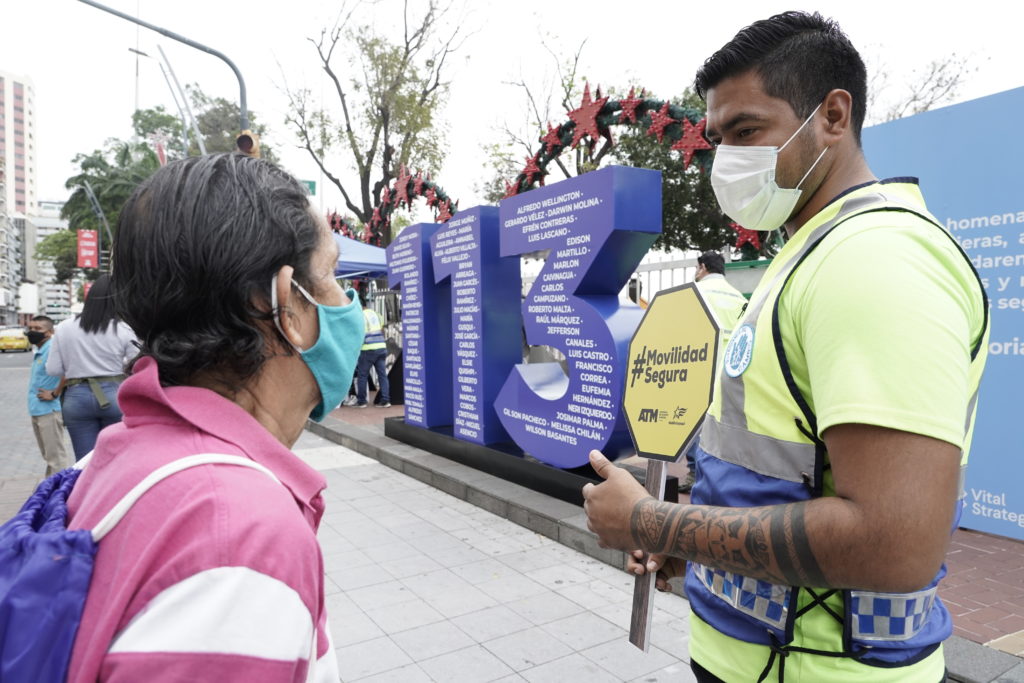
Municipal Authority of Transit workers engaged community members while remembering the 113 lives lost on the city’s roads last year.
Kampala, Uganda: Safe Streets For All
Community members in Kampala, Uganda recognized the day with the painting of a new crosswalk. The crosswalk seeks to make the road safer for students attending the Uganda Youth Aid Nursery and Primary School. The school offers free education to approximately 750 students residing in the Kasokoso slum of Nakawa Division in Kampala City. In Uganda last year, about 600 of the country’s 3,880 traffic deaths were children who were going to or coming back from school. Some students even skip their classes in fear of having to cross the street. This new crosswalk will provide a safe and accessible route for students and their families as they travel to and from school.
Local officials at the event included Nakawa Division Mayor Eng. Ronald Balimwezo, a traffic crash survivor himself, who highlighted the need for more resources to be allocated for road safety, including for post-crash care such as psychological support for victims and their families. In a statement, Kampala City Mayor Erias Lukwago highlighted the need to protect vulnerable groups, like children, the elderly and those with disabilities, when designing roads.
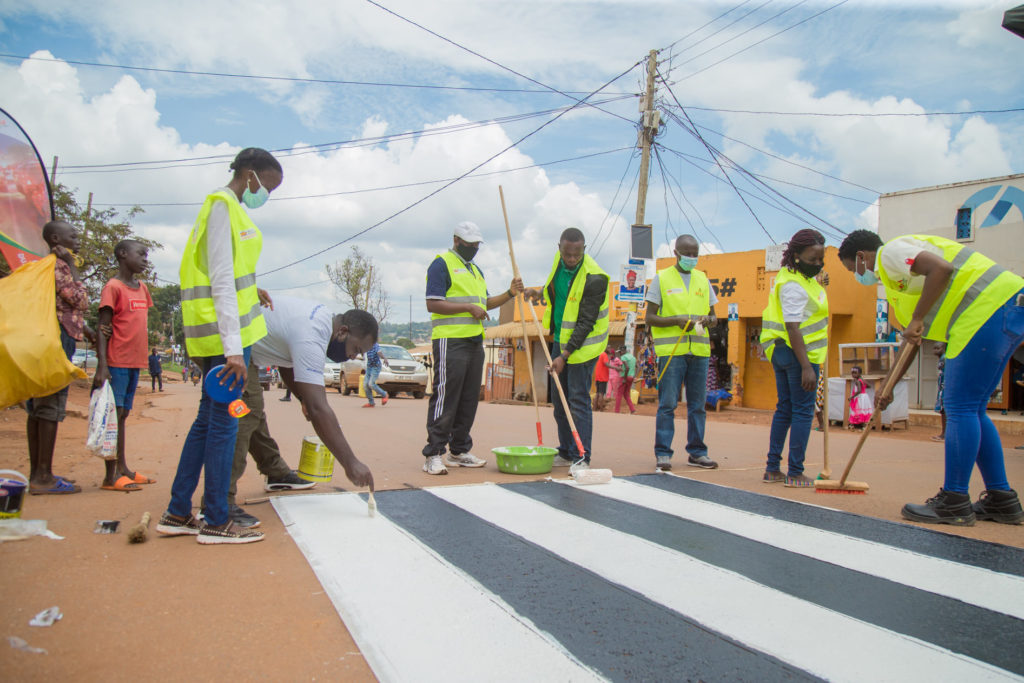
Buenos Aires: Lighting Up and Raising Awareness
Buenos Aires lit up the monuments in the city in yellow to bring awareness to road crashes and to recognize the lives lost. The city also selected intersections with high pedestrian use for interventions on the day, adding signs for motorists to slow down to ensure safe road use for all. An awareness video was shared online focusing on increasing adherence to speed limits.
Cali, Colombia: Shared Stories through Art
“The human losses that we register on our roads are a tragedy for the city. With this tribute, we acknowledge and remember all those who did not return home due to a road accident and reaffirm our commitment to continue working to improve the safety of the roads in Cali.”
Secretary of Mobility William Vallejo
On the Boulevard de Rio, residents of Cali paid tribute to victims of road accidents and their families with an art installation. Standing over 5 feet tall with shoes, helmets, motorcycle gloves, and other objects of remembrance, the installation represented victims and their absence in the city. In the center of the installation were the numbers 309–referring to the total number of fatalities the city suffered in 2019.
Cali’s Secretary of Mobility William Vallejo acknowledged the day expressing “The human losses that we register on our roads are a tragedy for the city. With this tribute, we acknowledge and remember all those who did not return home due to a road accident and reaffirm our commitment to continue working to improve the safety of the roads in Cali.”
To reduce crashes, the Cali mayor’s office also launched a mass media campaign showing the deadly consequences of speeding, particularly for motorcyclists –one of the most vulnerable road users. The campaign, developed in partnership with Vital Strategies and the Partnership for Healthy Cities, is running for one month and is coordinated with speeding enforcement.
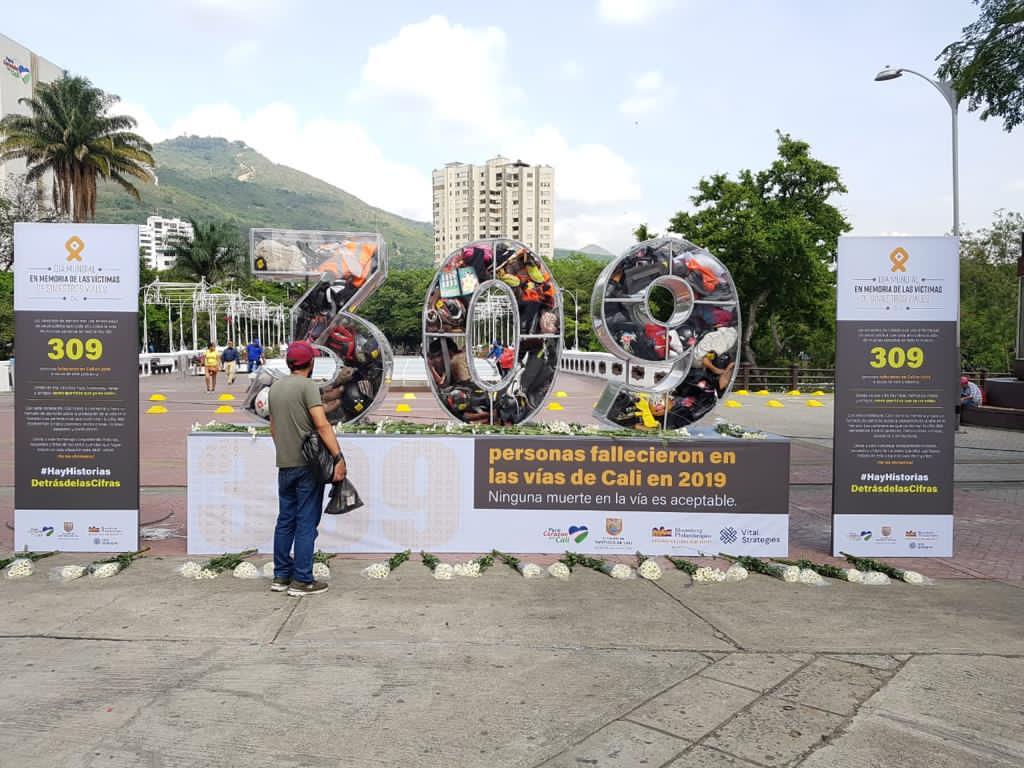
Members of the community in Cali remember the lives lost in the city from traffic crashes.
Bogota, Colombia: Shared Stories Through Art
The City of Bogotá also honored victims through a similar artistic exhibition in front of the National Museum of Colombia. The installation honored the 505 victims of road traffic crashes in the city last year. Shoes, helmets, motorcycle gloves, backpacks, notebooks, and other objects representing the stories and the presence of those who passed away were displayed.
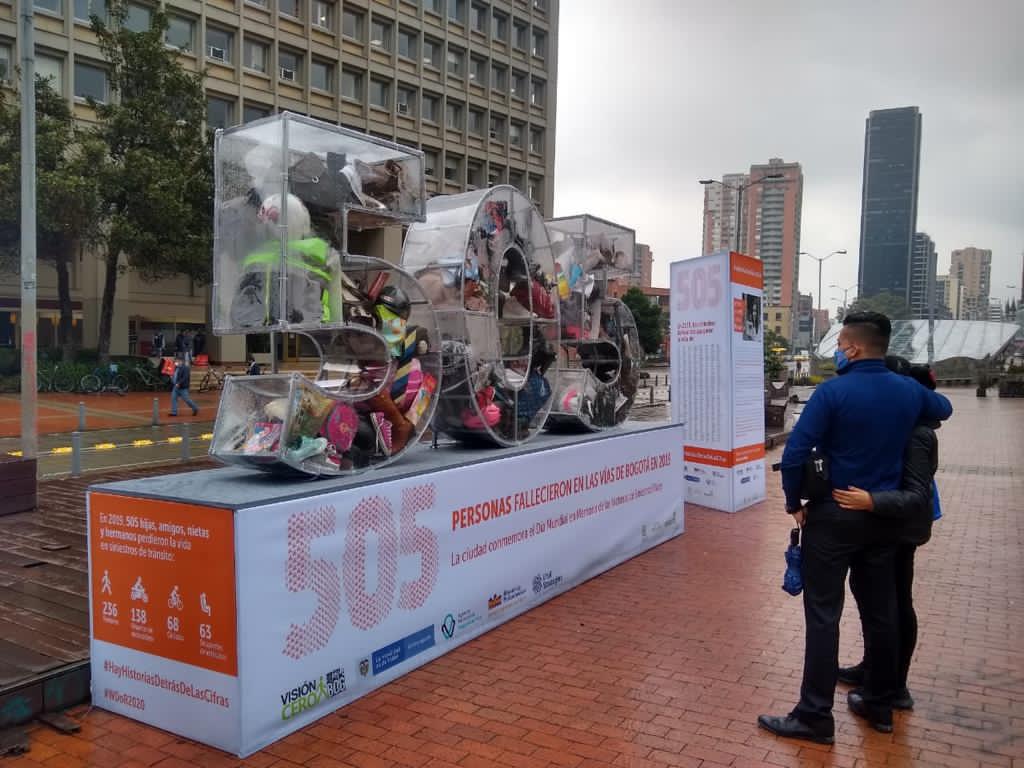
The city of Bogotá commemorated its loved ones lost from traffic crashes with an artistic installment.
Ho Chi Minh City, Vietnam: Flowers Remembering Loved Ones
The Ho Chi Minh City Traffic Safety Committee hosted an event to remember the 460 people who have died and 1,732 others who were injured on its roads in 2020 alone. Event attendees placed flowers in honor of those affected by traffic crashes, and officials spoke of the need for adherence to traffic laws and the avoidance of risky road behaviors such as drink driving, speeding and lack of helmet use on motorcycles.
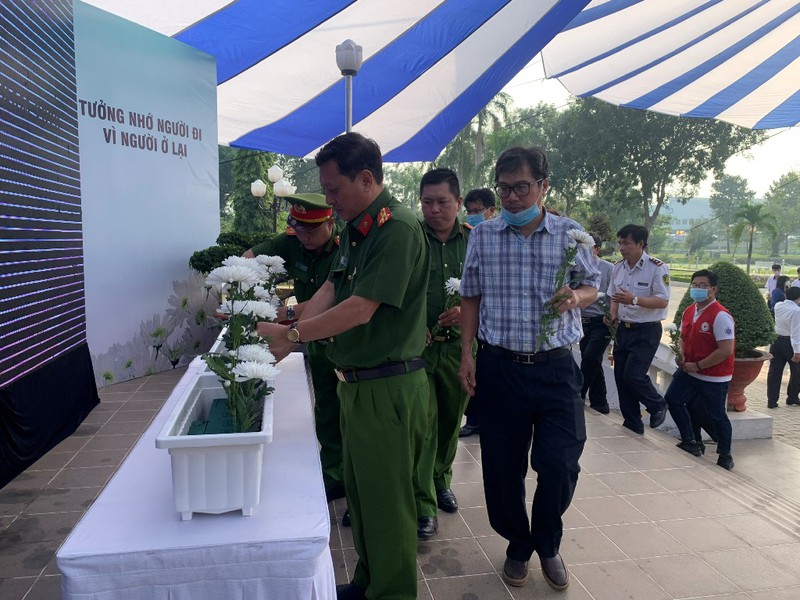
Ho Chi Minh City Traffic Safety Committee members lay flowers to honor the lives lost on the world’s roads each year.
Along with cities around the world, on the World Day of Remembrance for Road Traffic Victims Vital Strategies honors victims of road crashes and advocates for policies and initiatives to prevent future road traffic deaths and injuries. Governments and public health leaders have a responsibility to include road safety as part of their public health initiatives and policies. Everyone deserves the right to safe streets.
Recife and Salvador, Brazil: Remembering Loved Ones Through Art
In Brazil, the cities of Recife and Salvador commemorated World Day of Remembrance for Traffic Victims with art installations from artist Martin Santiago to represent the tragedies caused by traffic crashes. The installations were meant to showcase the human histories behind the numbers and were built with vehicle scraps and other objects commonly associated with road users and traffic crash victims. In Salvador, there were 133 traffic crash victims in 2019, the art installation was placed near the Farol de Barra. The city of Recipe lost 122 lives in 2019 from traffic crashes; the installation was placed on Av. Rio Branco at the city center. Both locations are important landmarks for the two Brazilian cities.


Addis, Ababa, Ethiopia: Sharing Stories through Performances
In Addis Ababa Ethiopia, the Ethiopian Ministry of Transport conducted a series of activities in honor of World Remembrance Day of Road Traffic Victims, including a candle lighting ceremony. Transport Minister Dagmawit Moges discussed the tragic loss of life that results from traffic crashes, as community members joined in and shared their stories of loss. Local musicians performed music as crash survivor shared their stories. The Addis Ababa Traffic Management Agency (TMA) also honored victims through a panel discussion on the consequences of road crashes led by TMA’s director general.

##
Vital Strategies is an implementing partner of the Bloomberg Philanthropies Initiative for Global Road Safety (BIGRS), a consortium carrying out proven road safety interventions in 10 cities and five countries around the world. We use our expertise to strengthen road crash surveillance systems and then use outcome data to inform policy and action. We guide the creation of strategic communication and mass media campaigns to change road user behavior. Finally, we serve as the main liaison between the initiative’s multiple global partners, governments, and city agencies to align efforts in infrastructure, enforcement, communication, and surveillance.
For more information on Vital Strategies’ work in road safety, visit: https://www.vitalstrategies.org/programs/road-safety/
About the Bloomberg Philanthropies Initiative for Global Road Safety: The Bloomberg Philanthropies Initiative for Global Road Safety (BIGRS) works with the world’s leading road safety organizations to implement road safety activities and coordinate with in-country governmental and non-governmental stakeholders. BIGRS emphasizes achieving outcomes and using high-quality monitoring and evaluation mechanisms to continually assess progress.
